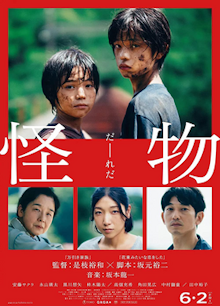Hirokazu Kore-eda keeps churning out solid films and so I keep watching them. He stays on the subject of children being let down by adults but this time around it is a little muddier who exactly is being wronged and who the guilty party or parties are. This film pulls you irresistibly into a story about bullying at school and a gross taunt about a child having the brain of a pig. There are red herrings and misunderstandings aplenty, complicating the search for the truth. Unfortunately once you dig past the confusion, what remains isn’t that substantial and hiding the nature of the boys’ relationship as a twist feels like an outdated move. It’s not bad but it’s weaker than his usual fare so I’d consider it missable.
Minato Mugino is a schoolboy who is being raised by his single mother Saori after his father’s death. She is concerned after he starts exhibiting strange behaviors such as messily cutting his own hair, losing a shoe and not coming home one night. She ends up finding him in an abandoned train tunnel and he asks her about whether a person’s brain can be switched with that of a pig. She suspects that his homeroom teacher Mr. Hori is abusing him and lodges a complaint at the school. The principal is evasive and repeatedly apologizes without wanting to delve into the issues in detail. When Minato’s behavior worsens, Saori confronts Hori directly who finally bursts out that it is Minato who is bullying Yori Hoshikawa, a smaller and somewhat effeminate boy in the same class. Concerned, Saori visits Yori’s house. She is discomfited that he seems to have been left to his own devices at home but Yori claims that Minato has never bullied him. Then we get flashbacks that recount the events from the perspectives of other characters, beginning with Hori. We see that he does want to talk things over with Saori but the principal and his fellow teachers pressure him that it is pointless and would only cause legal liabilities. Finally from Minato’s point of view, we discover that both boys are likely queer and attracted to one another. It is the whole class who is bullying Hori and Minato is under pressure to do the same in public or be ostracized in turn.
The shocking line about a pig’s brain in a boy’s body works as intended to draw the audience in and the film opens in a dramatic fashion as well, with the upper floors of a building on fire while the neighborhood looks on. It later turns out there is a hostess bar in the building and Hori is scandalously dating one of the hostesses working there. These are all great story hooks. Unfortunately they’re also red herrings as once it is revealed to the audience what is really going between the two boys and in Yori’s household, these details are mostly irrelevant. They’re additional layers of obfuscation and misunderstandings that prevent the adults from knowing what is really going on. Perhaps Kore-eda wants to highlight how prejudices complicate the difficulty of solving what on the surface looks like a straightforward bullying problem in school. Saori certainly judges Hori for seeing a hostess even though he himself treats it as a serious relationship. Yet I find this unsatisfying as the film finds all kind of excuses to prevent the adults from having any serious talks that would cut through the misunderstandings. It’s after all so easy for the director to just cut away before anything of note is discussed while the audience is left wondering how that encounter ended.
I do so love the one scene in the principal’s office in which all of the staff stonewall Saori. They repeatedly bow and proffer vacuous apologies without looking her in the eye or wanting to discuss details about the bullying. It’s the perfect example of a bureaucracy making a show of responsibility without actually being responsible. It would be interesting to wonder why they act this way. Perhaps as the other teachers say it’s just easier and less disruptive that way. Or is it because the cynical principal as a veteran educator thinks that it’s impossible or futile to get at the truth anyway? It’s frustrating that the film leaves their motivations and the character of the principal ambiguous. The story badly wants the adults to be left in dark but the fact that they don’t even make the least amount of effort to question the students makes it implausible to me. I feel that lacking any unique way to create a barrier between the adults and the children, the script throws out a mixed bunch of distractions instead. It’s inelegant and unsatisfying.
Some activists are upset that this film is really about queer boys being bullied and even abused, yet the script calls for that to be revealed as a twist. I wouldn’t go quite that far but it does feel like a cheap bait and switch with the pig brain insult being ultimately irrelevant. The way the film handles it by dancing around the subject and never actually saying that the boys are gay seems unduly timid, as if this were something from an older era. As usual Kore-eda does good work and his focus on telling stories from the perspective of children is laudable. But I feel that the script for this one is weak, substituting a scattered mix of elements instead of one good, singular idea.
